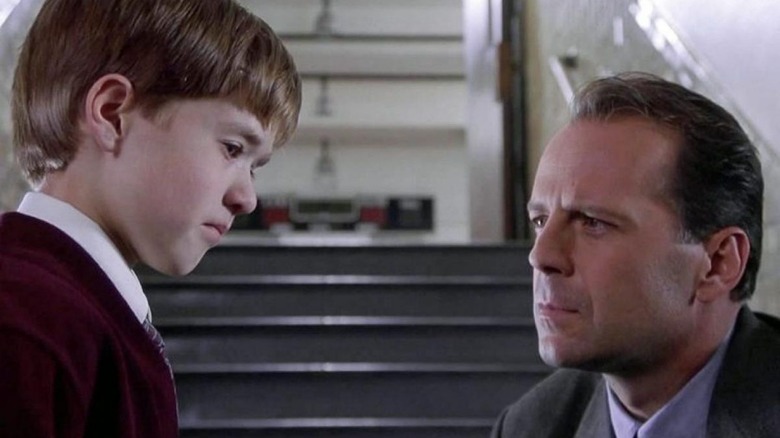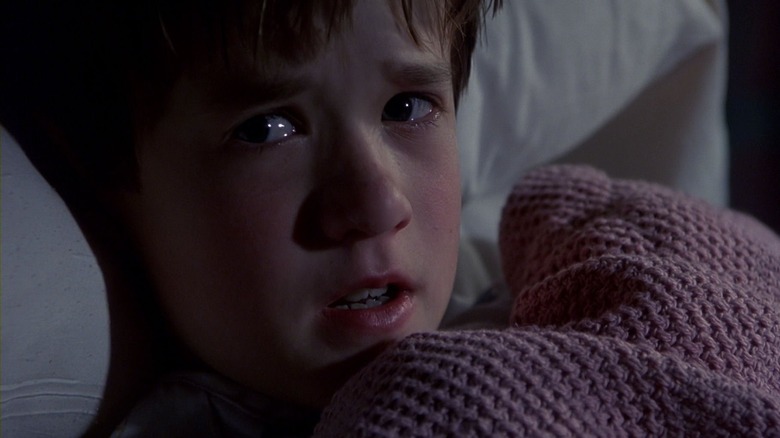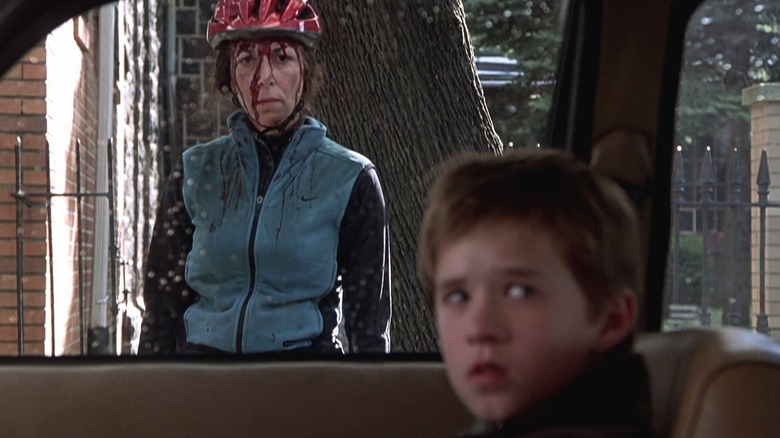M. Night Shyamalan's Best Movie Got A High-Level Studio Exec Fired
Prior to 1999, the phrase "sixth sense" typically referred to a keen sense of intuition, often so powerful as to be considered a supernatural power. The definition, however, was broad, and people could be said to have "a sixth sense" about, say, predicting horse races. Since the release of M. Night Shyamalan's 1999 ghost story "The Sixth Sense," however, the phrase now more commonly refers to one's ability to see and communicate with the dead. The film was that popular. At any rate, that's the superpower possessed by the young Cole (Haley Joel Osment), something that causes a great deal of consternation to his psychologist Malcolm (Bruce Willis). How can one treat a child when mutilated ghosts are randomly appearing to him?
"The Sixth Sense" also boasted a notorious twist ending wherein it was revealed that [REDACTED] was [REDACTED]. It was a shocking twist that few might have predicted. Luckily, "The Sixth Sense" also boasts several great performances (Osment and Toni Collette were both nominated for Academy Awards), as well as an appealingly overcast tone, grounded themes of healing and trauma, and some real psychological pain. Despite a career of unusual big swings, it might still be considered — debatably — the director's best movie. Shyamalan also received three Oscar nominations for the film, for Best Picture, Best Director, and Best Screenplay.
Shyamalan's spec script for "The Sixth Sense" was evidently so good, that David Vogel, the president of Disney at the time, took one look and immediately shelled out $2.25 million to buy it. Shyamalan has also attached a stipulation to the purchase that he would also be allowed to direct the film. Vogel agreed. All of this was done, however, without corporate approval. The story was related in a 2015 article in the Desert Sun.
David Vogel's own sixth sense
It should be remembered that "The Sixth Sense" wasn't just an awards darling, but a massive, massive hit. Made for $40 million, the film went on to earn $672.8 million worldwide. It was only outgrossed by "Star Wars: Episode I – The Phantom Menace" that year. David Vogel, it seems, was right to be hasty, snapping up what he assumed would be a big hit. In the Desert Sun article, however, Vogel lamented the changing corporate structure within Disney, pointing out that it was becoming increasingly micromanaged every day. He had just been granted a new boss to answer to, and then that boss was given a new boss, making creative freedom only that much more difficult. Previously, Vogel had the freedom to approve his own film projects. Now, he had to get several levels of corporate okays before any movement could be made.
Hating the system, Vogel merely ignored it. When he read "The Sixth Sense," he simply knew it would be a hit, saying that it had "more potential to be a big hit than any other movie I had ever read." It should be remembered that $2.25 million was the most any studio had ever paid for a script, doubtless setting off all kinds of corporate alarms. The sakle was secure, and Vogel was at peace with that. Better to ask for forgiveness than permission, he figured.
Almost immediately, though, his boss (unnamed in the Desert Sun article) came down on Vogel. To offset the costs, Vogel's boss begrudgingly handed part of the financing of "The Sixth Sense" to Spyglass entertainment, leaving only 12.5% ownership in the hands of Disney. Shortly thereafter, Vogel was fired outright.
Vogel's aftermath
As mentioned, Vogel's risks paid off in a big way. "The Sixth Sense" wasn't just a big hit, but was the most financially successful live-action film in Disney's history (at the time). Vogel could likely take some bitter comfort in the fact that his bosses, in reducing Disney's share of "The Sixth Sense" to 12.5%, stiffed themselves out of some of its grosses.
Vogel, without a gig, tried out retirement. He had amassed a great deal of money at Disney, and being fired burned him out. He converted to Buddhism and, for many years, took lengthy meditation retreats. He eventually returned to Palm Springs to set up Palm Springs Unified School District's Digicom Student Film Festival. That was in 2015. He began mentoring students about the fineries of filmmaking, paying for everything out of his own pocket.
Shyamalan, meanwhile, became a household name and went on to direct some highly celebrated — as well as several widely lambasted — feature films. Few liked his "The Last Airbender," an adaptation of a beloved Nickelodeon animated series, and his "The Happening" is roundly mocked for its tree-based premise, but his intense genre films "The Visit," "Split," and "Old" are fascinating. Shyamalan's films may be hotly debated, but one cannot deny that the success of "The Sixth Sense" allowed a fascinating, strange auteur into the mainstream Hollywood ranks. His next film, "Trap" follows a serial killer who has to outwit a police net surrounding the arena where he is seeing a concert with his daughter. It's due in theaters on August 9.


